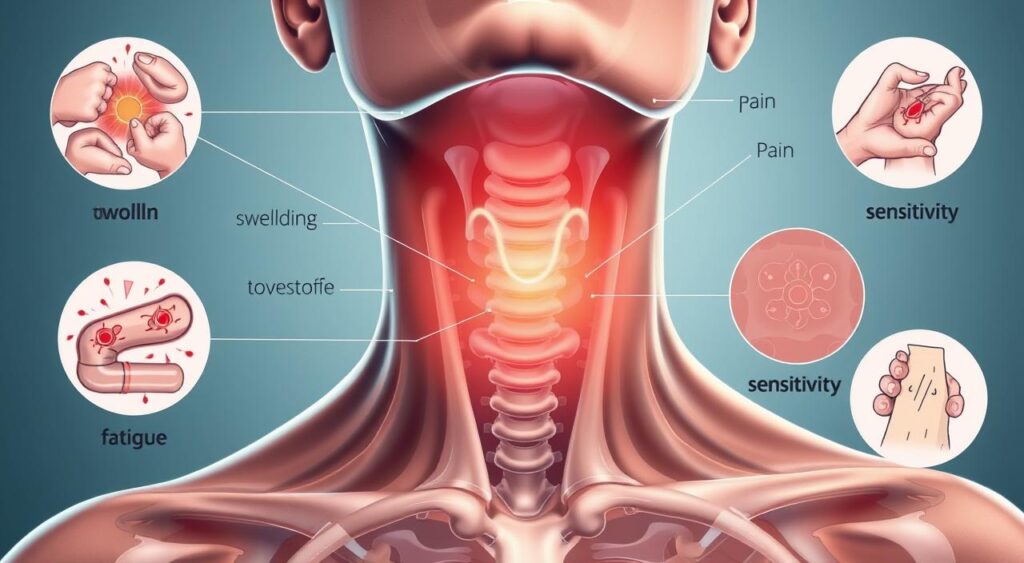Thyroiditis is a common issue that causes inflammation and damage to the thyroid gland. Symptoms include feeling tired, losing weight, and mood swings.
Thyroiditis affects the thyroid gland, causing inflammation. This can lead to various health problems. It’s important to know the causes and treatments to manage the condition.

Thyroiditis can be caused by autoimmune, viral, or bacterial factors. Treatment includes medication, lifestyle changes, and alternative therapies. These help address inflammation and related thyroid issues.
Key Takeaways
- Thyroiditis is a common endocrine disorder that affects the thyroid gland, leading to thyroid inflammation.
- The symptoms of thyroiditis can vary depending on the type and severity of the condition.
- Thyroiditis can be caused by autoimmune, viral, or bacterial factors, resulting in thyroid problems.
- Treatment options for thyroiditis include medication, lifestyle modifications, and alternative therapies to address thyroid inflammation.
- Understanding the causes and treatment options for thyroiditis is crucial for managing the condition and preventing long-term thyroid problems.
- Thyroiditis can have a significant impact on overall health, making it essential to seek medical attention if symptoms persist.
Understanding Thyroiditis: An Overview
Thyroiditis is when the thyroid gland gets inflamed. This can happen because of an autoimmune condition like hashimoto’s thyroiditis. The immune system mistakenly attacks the thyroid gland. The thyroid gland is key for metabolism, growth, and development. Thyroiditis can mess with these functions, causing symptoms and complications.
The thyroid gland is vital for the endocrine system. It makes hormones that control many body functions. An autoimmune condition like hashimoto’s thyroiditis can make the thyroid gland underactive. This leads to symptoms like fatigue, weight gain, and dry skin. Knowing about thyroiditis is important for managing and treating it.
What is Thyroiditis?
Thyroiditis means inflammation of the thyroid gland. It can be caused by autoimmune conditions, viral infections, or radiation. Hashimoto’s thyroiditis is a common autoimmune thyroiditis, making up most cases.
How the Thyroid Gland Functions
The thyroid gland makes two main hormones: T3 and T4. These hormones control metabolism, growth, and development. They are crucial for health. Thyroiditis can disrupt hormone production, causing symptoms and complications.
Impact on Overall Health
Thyroiditis can affect overall health, not just the thyroid gland. If not treated, it can lead to hypothyroidism, hyperthyroidism, and thyroid nodules. It’s important to see a doctor if symptoms get worse or don’t go away.
| Type of Thyroiditis | Cause | Symptoms |
|---|---|---|
| Hashimoto’s Thyroiditis | Autoimmune thyroid condition | Fatigue, weight gain, dry skin |
| Subacute Thyroiditis | Viral infection | Painful thyroid gland, fever, fatigue |
| Postpartum Thyroiditis | Hormonal changes after pregnancy | Mood swings, fatigue, weight loss |
Common Types of Thyroiditis
Thyroiditis is when the thyroid gland gets inflamed. This can cause thyroid problems and mess up how the gland works. There are many types of thyroiditis, each with its own symptoms and reasons. Knowing these differences is key to finding the right treatment for thyroid inflammation.
Here are some common types of thyroiditis:
- Acute thyroiditis: a rare but serious condition that needs quick medical help
- Subacute thyroiditis: a more common issue that can be managed with medicine and changes in lifestyle
- Chronic thyroiditis: a long-term problem that can lead to thyroiditis and other issues
It’s important to know the signs of thyroiditis to get medical help fast. Thyroid problems can really affect your health. Getting the right treatment can help control thyroid inflammation and stop serious problems later on.
Recognizing the Signs and Symptoms of Thyroiditis
Thyroiditis can cause a range of symptoms, from mild to severe. It’s important to recognize these signs early for proper treatment. Symptoms vary based on the type and severity of thyroiditis. Common symptoms include fatigue, weight loss, and muscle weakness.
Emotional and mental symptoms can also occur. These include anxiety, depression, and mood swings. If you notice these symptoms, it’s crucial to seek medical help. The treatment for thyroiditis depends on the cause and severity of the condition.
In some cases, thyroiditis is caused by an autoimmune disorder. Treatment may involve medication to manage the condition. Working closely with a healthcare provider is key to developing a personalized treatment plan. By recognizing symptoms and seeking medical attention, individuals can get the right treatment and improve their health.
Physical Symptoms
- Fatigue
- Weight loss
- Muscle weakness
Emotional and Mental Symptoms
- Anxiety
- Depression
- Mood swings
The Main Causes Behind Thyroid Inflammation
Thyroiditis is a complex condition with many thyroiditis causes. These include autoimmune, viral, and bacterial causes. Knowing these causes helps in creating effective treatment plans and avoiding complications. The thyroiditis diagnosis involves physical exams, medical history, and lab tests.
Genetics and environmental factors play a big role in autoimmune thyroid condition. Studies show that people with a family history of autoimmune disorders are at higher risk. Also, exposure to certain toxins and stress can trigger the condition.

- Autoimmune disorders, such as Hashimoto’s thyroiditis
- Viral infections, such as subacute thyroiditis
- Bacterial infections, such as acute thyroiditis
- Genetic predisposition
- Environmental factors, such as exposure to radiation
In conclusion, knowing the thyroiditis causes and thyroiditis diagnosis is key to managing the condition. By understanding genetics, environmental factors, and autoimmune thyroid condition, people can lower their risk. This improves their overall health.
Risk Factors and Triggers
Thyroid gland disorder, including hashimoto’s thyroiditis, can be triggered by various factors. It’s important to understand these risk factors. This knowledge helps in developing effective prevention and treatment strategies. Thyroid problems can be influenced by genetic, environmental, and medical factors.
Genetic Predisposition
People with a family history of thyroid problems are more likely to develop thyroid gland disorder. Hashimoto’s thyroiditis, in particular, has been linked to certain genetic markers.
Environmental Factors
Exposure to certain environmental toxins and stress can contribute to thyroid problems. A healthy diet and lifestyle can help mitigate these risks.
Medical Conditions
Certain medical conditions, such as autoimmune disorders, can increase the risk of developing thyroid gland disorder. It is essential to manage these conditions and monitor thyroid health.
The following table summarizes the risk factors and triggers for thyroiditis:
| Risk Factor | Description |
|---|---|
| Genetic Predisposition | Family history of thyroid problems |
| Environmental Factors | Exposure to toxins and stress |
| Medical Conditions | Autoimmune disorders and other medical conditions |
Diagnostic Process and Testing Methods
Getting an accurate thyroiditis diagnosis is key to effective thyroiditis treatment. Doctors use physical exams, blood tests, and imaging to check the thyroid gland disorder.
A physical exam might show neck swelling or tenderness. Blood tests measure thyroid hormone and antibody levels. Imaging, like ultrasound, looks at the thyroid gland’s size and shape.
At times, a fine-needle biopsy is needed. It takes tissue samples from the thyroid gland. These tests help find the cause of thyroiditis diagnosis and plan the thyroiditis treatment.
Early diagnosis and treatment are vital. They prevent complications and improve health outcomes. Working with a healthcare provider leads to a timely and accurate thyroiditis diagnosis. This way, a personalized thyroiditis treatment plan can be made.
Treatment Options for Thyroiditis
Thyroiditis needs a full treatment plan that covers physical, emotional, and mental health. The main goal is to manage symptoms, lower inflammation, and avoid long-term issues. Knowing what causes thyroiditis and its problems is key to a good treatment plan.
A healthcare expert can create a treatment plan just for you. This might include medicines, lifestyle changes, and other therapies. Some common treatments for thyroiditis are:
- Medicines to manage symptoms and reduce inflammation
- Lifestyle changes, like diet and stress management
- Alternative therapies, such as acupuncture and herbal supplements
It’s important to work with a healthcare professional to find the best treatment for you. The right approach can change based on your specific situation. By tackling the root causes of thyroiditis, you can better manage your symptoms and live a better life.
Managing Thyroiditis Long-term
Living with thyroiditis, a thyroid gland disorder, needs a long-term plan. This autoimmune thyroid condition can be tough to handle. But, with the right steps, people can lessen their symptoms and stay healthy.
Managing thyroiditis well means making lifestyle changes, taking medicine, and seeing doctors often. Self-care and managing stress are key to avoiding problems and getting better. Eating well and exercising regularly can help manage thyroiditis and lower the risk of future health issues.
Some important ways to manage thyroiditis long-term include:
- Working with a healthcare provider to create a treatment plan
- Taking medicine as directed to control symptoms and prevent issues
- Using stress-reducing activities like meditation or yoga to handle stress and anxiety
- Having regular doctor visits to check thyroid function and adjust treatment if needed

By using these strategies and working with a healthcare provider, people with thyroiditis can manage their condition. This helps improve their health and well-being.
Complications and Related Conditions
Thyroiditis can cause serious problems if not treated right. It’s important to know these issues to prevent and treat them well. Problems like thyroid inflammation can lead to bigger health issues over time.
Some common complications of thyroiditis include:
- Short-term complications, such as thyroid storm, which is a life-threatening condition that requires immediate medical attention.
- Long-term health risks, including an increased risk of developing other autoimmune disorders, such as rheumatoid arthritis or lupus.
- Associated autoimmune disorders, such as Hashimoto’s thyroiditis, which can increase the risk of developing other autoimmune conditions.
Early treatment is key to avoid long-term damage. People with thyroiditis need to stay close to their doctors. This way, they can keep their condition in check and adjust their treatment as needed. Knowing about these complications helps manage thyroiditis better and lowers the risk of future health problems.
Being aware of thyroiditis complications is crucial. It helps get the right treatment quickly. This way, people can avoid long-term health issues and live better lives.
Prevention and Lifestyle Recommendations
To prevent thyroiditis and manage its symptoms, making lifestyle changes is key. A thyroid gland disorder, like thyroiditis, can be managed with diet, stress management, and exercise.
People with an autoimmune thyroid condition should eat a balanced diet. This includes fruits, vegetables, and whole grains. Staying hydrated and avoiding processed foods can also help. Plus, managing stress through meditation or yoga can help the immune system and lower risk of complications.
Here are some tips to prevent thyroiditis:
- Regular physical activity, like walking or jogging, can reduce stress and improve health.
- Good sleep hygiene helps regulate the immune system.
- Avoiding smoking and limiting alcohol can lower the risk of complications.
By following these lifestyle tips and knowing the symptoms of thyroiditis, you can lower your risk. This can also improve your overall health.
Early recognition and treatment of thyroiditis are crucial for preventing complications and improving outcomes. By working with a healthcare provider and making lifestyle modifications, individuals can effectively manage their thyroid gland disorder and reduce the risk of long-term health risks.
| Lifestyle Modification | Benefits |
|---|---|
| Regular Exercise | Reduces stress, improves overall health |
| Balanced Diet | Alleviates symptoms, supports immune system |
| Stress Management | Regulates immune system, reduces risk of complications |
Conclusion
As we wrap up our look at thyroiditis, it’s clear this common thyroid problem needs a detailed plan to manage thyroid inflammation. Knowing the symptoms, causes, and treatments helps people take charge of their health. They can work with their doctors to find the best way forward.
Thyroiditis is a complex issue that affects well-being. If symptoms don’t get better or get worse, seeing a doctor is key. The right diagnosis and treatment can help manage thyroid problems and keep thyroid health in check.
Knowing a lot and being active in our health care is crucial for dealing with thyroiditis. By taking a whole-body approach, we can focus on our well-being and live better lives.
FAQ
Q: What is thyroiditis?
A: Thyroiditis is when the thyroid gland gets inflamed. This gland makes hormones that help with metabolism, growth, and development.
Q: What are the common types of thyroiditis?
A: There are several types of thyroiditis. These include acute, subacute, and chronic thyroiditis, like Hashimoto’s.
Q: What are the symptoms of thyroiditis?
A: Symptoms include feeling tired, gaining or losing weight, mood swings, neck pain, and being sensitive to cold or heat.
Q: What causes thyroiditis?
A: It can be caused by autoimmune diseases, viruses, or bacteria. Genetics and the environment also play a part.
Q: How is thyroiditis diagnosed?
A: Doctors use blood tests, imaging, and physical exams to diagnose thyroiditis.
Q: How is thyroiditis treated?
A: Treatment may include medicines, lifestyle changes, and alternative therapies. The plan depends on the type and severity.
Q: What are the potential complications of thyroiditis?
A: If not treated, thyroiditis can cause hypothyroidism, hyperthyroidism, and other autoimmune diseases.
Q: How can I prevent or manage thyroiditis long-term?
A: A healthy lifestyle, stress management, and following treatment plans can help. Regular doctor visits are also key.
